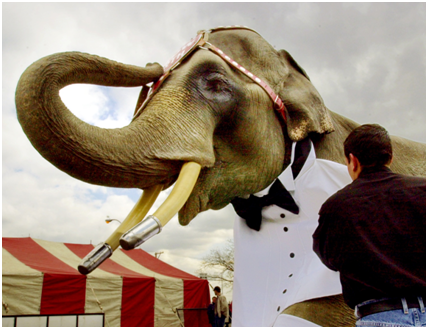The cruelest show on earth: Why animals don’t belong in circuses

John Costello/Philadelphia Inquirer
Bo, an Asian elephant with the Ringling Brothers Barnum and Bailey Circus, is fitted with a tux in Philadelphia, Pennsylvania on Tuesday, April 17, 2001.
March 8, 2016
Circuses are not the fun, whimsical environment that they have been portrayed as for the past 100+ years. In fact, they are quite the opposite.
As a child, my parents took me to the circus, as many parents did with their children. I loved the clowns, the acrobats, and most of all: the animals. What little kid wouldn’t love to see huge, exotic animals doing tricks as part of the “greatest show on earth”?
To this day I remain disgusted with myself for taking part in such cruelty. My small self had no idea what kind of inhumane torture was going on under the big top, right before my eyes. And if my parents had known, they never would have taken me to such a horrific event.
According to sources from PETA (People for the Ethical Treatment of Animals), elephants in circuses are trained from an early age to be afraid through a process called “breaking” or in other words, breaking their spirits. Ripped away from their mothers, they are taught fear by their circus trainers using electric prods, isolation, and bull hooks [a spear-like object with a spiked tip]. The message they are meant to receive is “perform, or you will be punished.”
According to the New York Times, in 2011 Feld Entertainment – the parent company of Ringling Bros. – was fined $270,000 by the USDA for violations of the Animal Welfare Act. Why? Their animals were found to have improper veterinary care, malnourishment, and living in unsafe & unhealthy conditions.
In early 2015 USA Today reported that the Ringling Brothers circus announced they were going to be phasing out their elephant acts by 2018. And recently, they moved that date to May 2016. They claimed it was to save money.
The truth is they chose to phase out the shows due to protest, fines, and a public outcry that has been gaining momentum for years.
Perhaps people started seeing the bloody injuries on the elephants that are routinely covered up with a gray powder. Maybe they started hearing the stories of the big cats dying in their cages due to overheating and panic. Or could it have been that they heard the story of Tyke, the elephant from a Hawaiian circus that fled the show in fear, killed his trainer, and was later shot dead?
PETA have released numerous photos and videos of the cruel, bloody training methods used by circuses. It was then that parents started becoming skeptical as to whether or not they should be taking their children to events where such cruelty is evidently practiced.
However, there is still a problem with the parents that refuse to recognize how detrimental it is to be entertaining their children with such acts of animal abuse.
The Kelly Miller Circus is a show that often travels to schools, and has a rather lengthy record of mistreatment of their animals. Reports from PETA and the USDA list several citations including failure to provide veterinary care for injured animals, failure to maintain safe and sanitary enclosures, and felony charges against their trainers for abuse of animals.
I recently participated in a police-regulated protest against this circus at a high school where it was set to perform, in which I was approached by a father. “Don’t you think you’re ruining this experience for the children?” he said. To him, I calmly replied “Don’t you think we should be raising our children to respect life rather than abuse it?”
It is this type of ignorance that is hurting our society much more than it is helping it. And it is time for us to wake up: animals are not ours to use for entertainment.
“Learning to respect all species is so important, to their livelihood and to ours,” said English teacher Rachel McBride, a vegetarian who agrees that animals should be respected, not expected to prance around in silly outfits. “Anytime an animal, or a human for that matter, is forced to do something against their will/nature, it’s not an enjoyable experience.”





















































